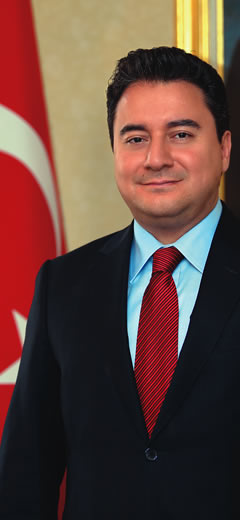 |
|
A 'TRANSFORMATIONAL PROCESS'
Despite the recession, Babacan is turning Turkey into an economic powerhouse
By Hugh M. Cook
Ali Babacan '92, Turkey's deputy prime minister for financial and economic affairs, has something that many others in his occupation wish they had: a fast-growing economy.
Last year, Turkey's economy was projected to grow by more than 7 percent — second only to China — following a 9-percent increase in 2010.
Just as important, Turkey's debt-to-GDP ratio (the metric that caused investors to shy away from nations such as Greece and Italy) dropped from 74 percent of GDP in 2002 to 39.9 percent in 2007. "Fiscal discipline [has been] the cornerstone of our economic program," says Babacan. "For the last decade, we have been pursuing a comprehensive, far-reaching structural reform agenda to support macroeconomic policies."
Turkey's current financial state is far removed from the one that Babacan inherited when he first took office in 2002. Then, the nation was reeling from a financial meltdown that had resulted in the collapse of the lira and the banking system.
To rebuild the nation's financial infrastructure, Babacan helped implement the Banking Sector Restructuring Program and expanded the supervision mandate of the Banking Regulation and Supervision Authority.
Babacan believes that these actions kept the Turkish banking system immune from the 2008-09 banking crisis. "None of the Turkish banks was bailed out," he says. "No government intervention was necessary."
A graduate of Middle East Technical University, Babacan attended Kellogg on a Fulbright Scholarship before joining the financial consulting firm Quantitative Risk Management and serving as chairman of his family's Turkish-based textile company.
In 2001, he co-founded the Justice and Development Party (AK Parti) because it offered an "unmatched opportunity to serve the nation." The AK Parti is now widely credited for expanding democratic rule in Turkey.
In his current position, Babacan takes part in preparing the national budget, serves as a National Security Council member and oversees institutions such as the Undersecretariat of Treasury, Banking and Capital Markets authorities. He also represents Turkey at G20 ministerial meetings and meets frequently with academics, economists and business leaders "to have the views, approaches and suggestions from a very wide circle."
One item that remains on his to-do list, however, is securing Turkey's membership in the European Union.
To achieve this, Turkey has implemented a series of economic and human rights reforms. "EU has provided us with the benchmarks and criteria [in] all these areas," Babacan explains.
Even if Turkey doesn't obtain EU membership during his watch, Babacan has made his mark.
"Looking at the past nine years, Turkey has gone through an enormous political, social and economic transformation process," he says. "And I have the pleasure and honor to contribute to this transformational process."


